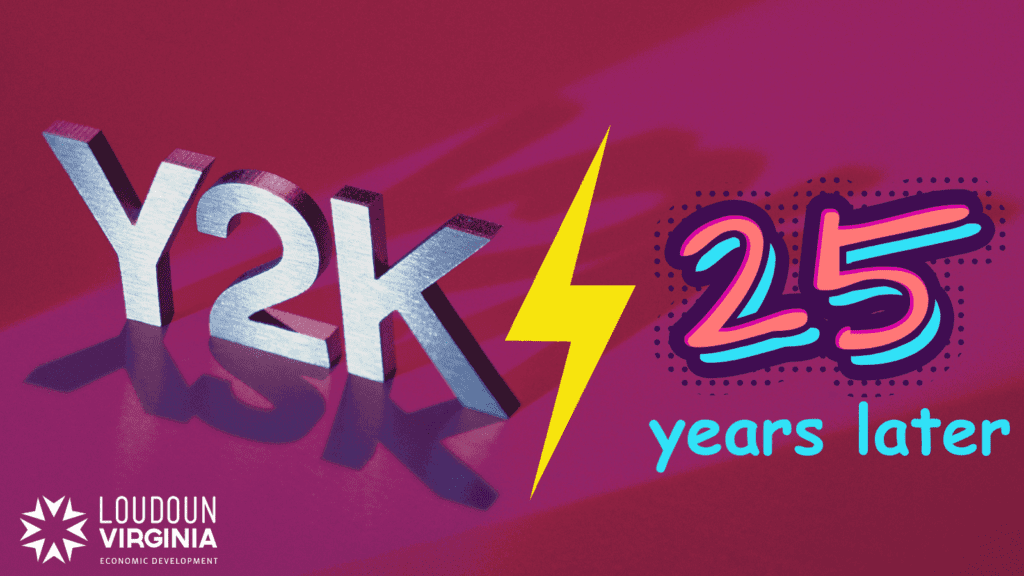We literally held our breath.
In the moments leading up to Y2K, anticipation and uncertainty gripped the world. On December 31, 1999 at 11:59pm on the East Coast of the United States, millions of people watched the digital clocks on their computers and cell phones, which were owned by only 28% of Americans, and waited for the next minute to see what would happen. The buzz of two-digit year formatting in programming raised fears of a global crisis, leaving governments, businesses, and IT teams anxiously waiting to see if their fixes would correctly interpret the year as 2000 instead of 1900. This seemingly harmless glitch known as the Y2K bug—a simple but potentially devastating flaw in computer systems—threatened global infrastructure from financial systems to power grids. As the world moved on without incident once the clock struck midnight, Northern Virginia’s technology sector used the potential disaster as a defining moment for the area, helping to solidify its role as a major tech hub.
Two companies that played a huge role in Northern Virginia’s tech boom were America Online (AOL) and UUNET. These companies helped address the Y2K challenge and laid the foundation for the region’s growth in technology and connectivity.
Headquartered in Loudoun County, AOL was synonymous with the internet boom of the late 1990s. Their colorful CDs revolutionized in-home internet access at a time when the internet was mainly accessible in education, corporate, and military environments. While most people associate AOL with the “You’ve Got Mail” voice bot and slogan, local government, investors, and tech companies in the region took note of the company’s innovations driving Northern Virginia’s economy.
Meanwhile, UUNET Technologies, which moved to Loudoun around 1998, was a pioneer in internet infrastructure development. As one of the first and largest internet service providers, UUNET actively helped build the infrastructure—the underground cables and complex electronic systems—that spearheaded the digital revolution. By the time the Y2K scare hit, UUNET’s networks were essential to ensure business and government systems in the region remained connected and operational.
In addition to AOL and UUNET, MCI and WorldCom played significant roles in Northern Virginia’s tech boom. MCI, one of the first major telecommunications companies to establish itself in the region, was a key player in expanding global communications infrastructure. WorldCom, which acquired both UUNET and MCI in 1996 and 1998 respectively, was paramount in growing the region’s status as a major hub for telecommunication and internet services. UUNET was later absorbed into MCI in 2001 and then MCI was acquired by Verizon in 2006. Verizon, which is located in Ashburn’s “Data Center Alley,” is the third largest employer in Loudoun and still uses UUNET’s infrastructure as the backbone of its Verizon Business subsidiary.
Companies like AOL and UUNET, alongside countless government IT teams, demonstrated that the region was fully prepared to tackle a global technology crisis. Instead of causing anticipated chaos, the Y2K problem became a showcase of preparedness and technical expertise. The billions invested in fixing systems not only mitigated risk but also spurred advancements in IT processes and practices. Northern Virginia emerged from the Y2K challenge with a reputation for innovation and readiness, attracting even more technology businesses to the area.
Today’s tech market in Loudoun remains strong and resilient. Since Y2K, Loudoun’s tech companies have quadrupled in numbers, increasing from approximately 300 in 1999 to 1,200 in 2024, becoming one of the fastest-growing technology hubs in the nation. The infrastructure built by companies like AOL and UUNET, combined with the area’s proven ability to manage large-scale IT challenges, fueled rapid development. Additionally, AOL and other early tech companies attracted skilled IT professionals and helped create an ecosystem of talent and infrastructure that continues today. As a result, Loudoun has seen a significant rise in tech workers, growing from approximately 15,000 in 1999 to 23,000 in 2024. The combination of this groundwork from the late 1990s and early 2000s has made Northern Virginia a leader in cloud computing, cybersecurity, and IT services, recruiting successful tech startups such as Vertex11, Fortreum, and noHack, the latter of which won the Industry Transformation Innovation and People’s Choice categories in the 2024 Loudoun Innovation Challenge.
Loudoun remains a model of innovation, infrastructure, and readiness and demonstrates how a potential crisis can be an opportunity for growth. The Y2K scare may have faded into history as a near-miss, but its impact on Northern Virginia’s tech industry is undeniable. It showcased the region’s talent, resilience, and growing influence in the technology sector. Now that the threat has passed, we can easily say that Y2K was a catalyst that propelled Northern Virginia, and Loudoun in particular, into the forefront of global technology.
Publisher: Source link











